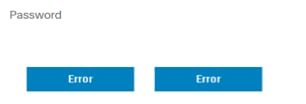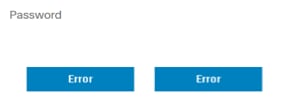Introduction
This document describes an issue with Cisco Secure Email Encryption Service (formerly Cisco Registered Envelope Service) encrypted emails if the entity that receives the emails has a Mimecast Secure Email Gateway and URL rewrites are enabled.
Problem
Two separate behaviors have been observed in the field in regards to Mimecast and Cisco Secure Email Encryption integration.
- Mimecast changes the backward slash to a forward slash, which results in a browser redirect failure.
- Mimecast rewrites the URL in the attachment and corrupts the payload.
Browser Redirect Issue
Description
Mimecast Secure Email Gateway changes the backward slash to a forward slash in the securedoc.html attachment, which then corrupts the payload and causes end-users to fail to open messages.
Symptoms
General symptoms include end-users that are not able to enter their passwords or that the password field produces errors.

Identify the Issue
1. Request any impacted end-users to share the securedoc.html
2. Open the securedoc.html file in your text editor of choice (For example, Notepad++) or share it with Cisco TAC and search for the string: BrowserRedirect
3. Review the full URL with the BrowserRedirect and confirm whether there is a backward or forward slash at the end.
a. Correct URL (Ends with Backward Slash) - java.sun.com/webapps/getjava/BrowserRedirect\
b. Problematic URL (Ends with Forward Slash) - java.sun.com/webapps/getjava/BrowserRedirect/
4. An incorrect URL ends with a forward slash and allows us to confirm the problematic behavior.
Solution
1. An encryption (PXE) engine update has been released that includes a fix that resolves the issue. Please run updatenow force from the CLI to trigger the update.
(Machine esa.example.com)> updatenow force
Success - Force update for all components requested
2. Once an update has been started, you can then use the encryptionstatus command to confirm the update has been applied.
(Machine esa.example.com)> encryptionstatus
Component Version Last Updated
PXE Engine 8.1.5.007 29 Jul 2022 16:58 (GMT +00:00)
Domain Mappings File 1.0.0 Never updated
3. If successful, the PXE Engine output shows the current date and time.
(Machine esa.example.com)> encryptionstatus
Component Version Last Updated
PXE Engine 8.1.5.007 29 Jul 2022 16:58 (GMT +00:00)
Domain Mappings File 1.0.0 Never updated
URL Rewrite Issue
Description
Mimecast Secure Email Gateway rewrites the URLs in the securedoc.html attachment, which then corrupts the payload and causes end-users to fail to open messages.
Symptoms
General symptoms include end-users that are not able to enter their passwords or that the password field produces errors.

Identify the Issue
1. Request any impacted end-users to share the securedoc.html
2. Open the securedoc.html file in your text editor of choice (For example, Notepad++) or share it with Cisco TAC and search for the string: protect-us.mimecast.com
3. Review the rewritten URLs and refer to the image for a before and after comparison.

4. When the securedoc.html attachment is sent through the Mimecast Secure Email Gateway, the referenced URLs are rewritten incorrectly which then causes the HTML syntax to break. Due to this, end-users are unable to open the encrypted emails.
For example:
https://res.cisco.com:443/websafe/help?topic=AddrNotShown',{'localeUI':getLocale()}) is rewritten to https://protect-us.mimecast.com/s/fQ-lCkRMXRUn3B5DDIQIC_L?domain=res.cisco.com':getLocale()}). As you can see, after the URLs are rewritten, the localeUI field is removed.
Solutions
1. Forward the email in question to mobile@res.cisco.com. When received, end-users would then be able to click on the link and successfully decrypt the email.
or
2. Enable the Easy Open feature. Encrypted emails would be sent to the recipients with a view link in the body of the email. End-users would then be able to click on the link and decrypt the email.
or
3. Bypass the sender domain of res.cisco.com on the Mimecast Secure Email Gateway.
Additional Information
Cisco Secure Email Gateway Documentation
Secure Email Cloud Gateway Documentation
Cisco Secure Email and Web Manager Documentation
Cisco Secure Product Documentation




 Feedback
Feedback